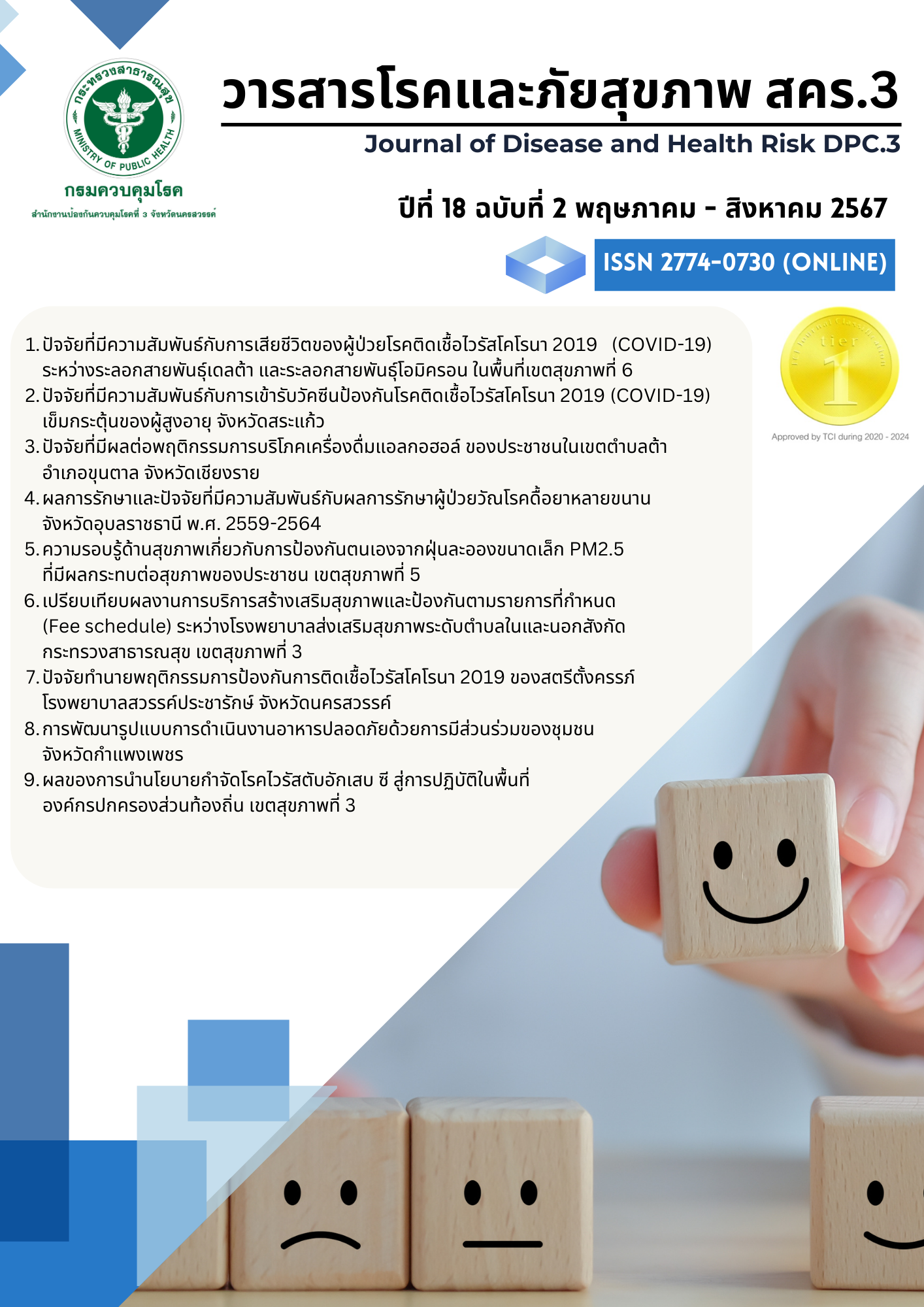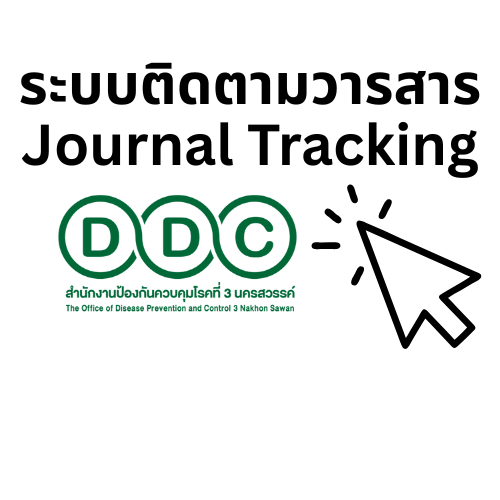Factors Associated with Assessing The COVID-19 Vaccine Booster Dose Among The Elderly in Sa Kaeo Province
Keywords:
Vaccine booster dose, Accessing vaccination, Elderly, Sakaeo ProvinceAbstract
COVID-19 vaccine booster dose is essential to mitigate severe illness and death pandemics, especially in the elderly. However, they have had far less access. This Community-based case-control study, which applies the PRECEDE Model. This study aimed to investigate factors effected with assessing the COVID-19 vaccine booster dose among the elderly in Sa Kaeo province. Using data from the Ministry of Public Health's central database, the MOPH Immunization Center (MOPH IC) was used for searching the sample group and collected information through face-to-face interviews. Descriptive statistics were used to describe general characteristics, and conditional logistic regression was used to analyze the association. The results have shown that 324 participants were divided into case and control groups, each consisting of 162 individuals. Half of them were female (53.7%). The average age was 67 years. Factors associated with assessing the COVID-19 vaccine booster dose were statistically significant at p-value <0.05 including a high perceived severity of infection that was contracting COVID-19 leading to severe illness or death (OR adj = 7.951, 95% CI = 1.133-55.815), perception of side effects from the COVID-19 vaccine at slightly confident level (OR adj = 5.254, 95%CI = 1.381-19.983) and no confidence (OR adj = 31.201, 95% CI = 5.321-182.969), and never having experienced side effects after receiving the previous vaccination (OR adj = 3.041, 95% CI = 1.141-8.108). It was also found that both groups desired proactive vaccination services within the community or receiving services at nearby facilities every day. Therefore, It is critical to enhance health literacy for the elderly, especially regarding the perceived severity of infection and vaccine side effects, and to communicate information to the elderly, including caregivers, to understand adverse reactions and self-management after COVID-19 vaccination, to ensure the elderly have more confident and make informed decisions about accessing vaccination services appropriately.
References
Baraniuk C. How long does covid-19 immunity last?. BMJ 2021; 373: n1605.
Silva-Cayetano A, Foster WS, Innocentin S, Belij-Rammerstorfer S, Spencer AJ, Burton OT, et al. A booster dose enhances immunogenicity of the COVID-19 vaccine candidate ChAdOx1nCoV-19 in aged mice. Med 2021; 2(3): 243-62.
Callaway E. COVID vaccine boosters: the most important questions. Nature 2021; 596: 178-80.
Mizrahi B, Lotan R, Kalkstein N, Peretz A, Perez G, Ben-Tov A, et al. Correlation of SARS-CoV-2-breakthrough infections to time-from-vaccine. Nat. Commun. 2021;12(1):6379.
Department of Disease Control. Ministry of Public Health. The situation of the coronavirus disease 2019. [cited 2022 February 21]. Available from: https://ddc.moph.go.th/covid19 dashboard/?dashboard=select-trend-line.
Ministry of Public Health. Booster dose vaccine. [cited 2022 February 21]. Available from: https://www.dmh.go.th/news-dmh/view. asp?id=31209.
Department of Disease Control. Ministry of Public Health. The situation of COVID-19 vaccination service. [cited 2022 February 11]. Available from: https://ddc.moph.go.th/vaccine-covid19/getFiles/10/ 1644807823246.pdf.
Ua-Kit N, Pensri L. Utilization of the PRECEDE MODEL in Health Promotion. Thai Red Cross Nursing Journal, Vol. 11 No.1 Janualy-June 2019, p. 38-48.
Rzymski P, Poniedzialek B, Fal A. Willingness to receive the booster COVID-19 vaccine dose in Poland. Vaccines (Basel) 2021;9(11):1286.
Malesza M, Wittmann E. Acceptance and intake of COVID-19 vaccines among older Germans. J Clin Med 2021;10(7):1388.
Wong MCS, Wong ELY, Huang J, Cheung AWL, Law K, Chong MKC, et al. Acceptance of the COVID-19 vaccine based on the health belief model: A population-based survey in Hong Kong. Vaccine 2021; 39(7): 1148-56.
de Andres AL, Garrido PC, Hernández-Barrera V, Del Pozo SV, de Miguel AG, Jiménez-García R. Influenza vaccination among the elderly Spanish population: trend from 1993 to 2003 and vaccination-related factors. Eur J Public Health 2007; 17(3): 272-7.
Alfageeh EI, Alshareef N, Angawi K, Alhazmi F, Chirwa GC. Acceptability of a COVID-19 vaccine among the Saudi Population. Vaccines (Basel) 2021; 9(3): 226.
Thaweelap S, Pobkeeree V. Factors associated with the acceptance of seasonal Influenza vaccination among the elderly in Phraphutthabat district, Saraburi province. The 12th Srinakharinwirot University Research Conference, 20 – 21 March 2019. Srinakharinwirot University 2019:740-51.
Shmueli L. Predicting intention to receive COVID-19 vaccine among the general population using the health belief model and the theory of planned behavior model. BMC Public Health 2021;21(1):804.
Contoli B, Possenti V, Minardi V, Binkin NJ, Ramigni M, Carrozzi G, et al. What is the willingness to receive vaccination against COVID-19 among the elderly in Italy? Data from the PASSI d' Argento Surveillance System. Front Public Health 2021;9: p736976.
Reiter PL, Pennell ML, Katz ML. Acceptability of a COVID-19 vaccine among adults in the United States: How many people would get vaccinated?. Vaccine 2020;38(42):6500-07.
Yadete T, Batra K, Netski DM, Antonio S, Patros MJ, Bester JC. Assessing acceptability of COVID-19 vaccine booster dose among adult Americans: A Cross-Sectional Study. Vaccines (Basel) 2021;9(12):1424.
Dambadarjaa D, Altankhuyag GE, Chandaga U, Khuyag SO, Batkhorol B, Khaidav N, et al. Factors associated with COVID-19 vaccine hesitancy in Mongolia: A Web-Based Cross Sectional Survey. Int J Environ Res Public Health. 2021, 18, 12903.
Wang J, Jing R, Lai X, Zhang H, Lyu Y, Knoll MD, et al. Acceptance of COVID-19 vaccination during the COVID-19 pandemic in China. Vaccines (Basel) 2020;8(3):482.
Lau JTF, Kim JH, Yang X, Tsui HY. Cross-sectional and longitudinal factors predicting influenza vaccination in Hong Kong Chinese elderly aged 65 and above. J Infect 2008; 56(6): 460-8.
Sa Kaeo Provincial Health Office. The situation of coronavirus disease 2019 and vaccine administration Sa Kaeo province. 2022.
Thanomsiang N. Sample size calculation for Case-Control Study. [cited 2022 February 21]. Available from: https://home.kku.ac.th/nikom/ss_ucc_mcc.pdf.
Chuenjai K, Punturaumporn B. Factors affecting the decision to vaccinate against CORONAVIRUS (COVID-19) of the population in Bangkok. [cited 2022 February 21]. Available from: https://mmm.ru.ac.th/MMM/IS/twin-9/6214154037.pdf.
Siriraj Academic Center of Geriatric Medicine. The Faculty of Medicine Siriraj Hospital. Caring for the elderly during the COVID-19 pandemic. [cited 2022 February 21]. Available from: https://www.si.mahidol. ac.th/sidoctor/ e-pl/admin/article_files/1417_1.pdf.
Department of Disease Control. Ministry of Public Health. Guidelines for COVID-19 vaccination in the 2021 outbreak situation in Thailand, 2nd revised edition. Samutprakarn: TS INTERPRINT; 2021.
Zarocostas J. How to fight an infodemic. Lancet [Internet]. 2020 [cited 2023 Oct 1]; 95(10225):676. Available from: https://www.thelancet. com/action/showPdf?pii=S0140-6736%2820% 2930461-X.
Roozenbeek J, Schneider CR, Dryhurst S, Kerr J, Freeman ALJ, Recchia G, et al. Susceptibility to misinformation about COVID-19 around the world. R Soc Open Sci. 2020; 7(10): 201199.
Downloads
Published
How to Cite
Issue
Section
License
Copyright (c) 2024 Journal of Disease and Health Risk DPC.3

This work is licensed under a Creative Commons Attribution-NonCommercial-NoDerivatives 4.0 International License.
Copyright notice
Article published in the Journal of Disease and Health Risk DPC.3 Nakhon Sawan. It is considered a work of academic research and analysis as well as the personal opinion of the author. It is not the opinion of the Office of Disease Prevention and Control 3, Nakhon Sawan. Or the editorial team in any way Authors are responsible for their articles.
Privacy Policy
Name, address and e-mail address specified in the Journal of Disease and Health Risk DPC.3 Nakhon Sawan. It is used for identification purposes of the journal. And will not be used for any other purpose. Or to another person.









